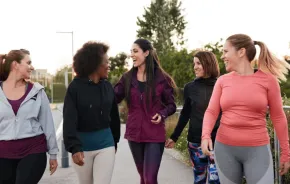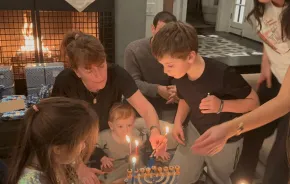Editor's note: On Jan. 23, 2014, mindfulness leaders Jon and Myla Kabat-Zinn will kick off ParentMap's 2014 lecture series with a talk on Mindful Parenting. Don't miss it -- it sold out last year! This post by Positive Discipline Trainer Casey O'Roarty is part of our Growing Character series on fostering mindfulness.
 In my experience of parenthood, mindfulness and self-awareness go hand in hand. Fostering self-awareness has been the biggest learning for me as I raise my son and daughter. So many emotions tag along with self-awareness.
In my experience of parenthood, mindfulness and self-awareness go hand in hand. Fostering self-awareness has been the biggest learning for me as I raise my son and daughter. So many emotions tag along with self-awareness.
My journey with mindfulness started when I became a parent. Prior to this chapter of my life, I hadn’t been challenged in a way that required me to be self-aware, to practice mindfulness. I had never found myself overwhelmed by my emotions. I didn’t become unglued and treat people I cared about poorly…
Oh, the gifts of motherhood.
I am grateful to have been given the opportunity to become a student of Positive Discipline in 2007. I was surprised, however, to learn that much of the practice had to do with looking inward and recognizing my own part in the problems I was having with my kids. This was humbling. And as I looked back at the early months of having two children, there was some shame there, too.
If we learn to open our hearts, anyone, including the people who drive us crazy, can be our teacher.
Pema Chodron
So, I learned to become self-aware. I learned to use those feelings of shame to guide me in making things right with my kids. I recognized (usually after the fact) that I had treated my kids poorly, and I set out to make amends.
In Positive Discipline, Jane Nelsen talks about the 3 Rs of Recovery. These include Recognize, Reconcile and Resolve. Recognizing our mistakes is an inward process — we have to be able to wade through our emotional baggage and realize, yes, I screwed up. How I treated my child was not helpful or kind. This is the first step.
Reconciling is the process of owning up to that mistake and apologizing to your child. This is not a time to let them know that if they just would have done what you said… No, this process is not about them, it’s about you and your behavior. Reconciling has an authentically direct and contrite sound to it: “I’m sorry I yelled at you; it’s not okay to treat people like that.” Short and sweet is a-ok.
Resolving the problem is letting your child know the steps you will take to change your behavior next time. You can ask for ideas from him, or share your own plan. I didn’t realize it early on when I did this, but this is the step that holds the most power, as it consolidates your commitment to change.
When I learned about making amends with my kids I remember thinking that I would be constantly apologizing for my parental misdeeds. I remember feeling like my kids would eventually not believe me, that I would be apologizing all the time, that my words would have no meaning. This was my fear. Looking back I realize that I didn’t see the whole picture. I work with lots of parents who have trouble seeing the whole picture as well, and they are left feeling as though their situation is hopeless.
Yet, a funny thing happens. When you own what you say and do — in an authentic relationship with your kids — and you mean what you say when you say “I am going to be better next time,” you actually work towards being better next time! When I tell my kids, “Next time I feel that angry, I am going to notice my body and go walk away to calm down,” I am committing to doing that. And now, as I make fewer mistakes, and still make heart-centered amends with my kids when I do make mistakes, I know that they believe me when I say I’m sorry.
Your visions will become clear only when you can look into your own heart. Who looks outside, dreams; who looks inside, awakes.
C.G. Jung
This has been a big a-ha for me lately. I am changing as a parent, as a human being. Self-awareness is a big piece of this. I am training myself to look inward when I am feeling out of control. I am learning to acknowledge the signals my body gives me and to recognize what to do to physically feel more in control. When I can calm my body, my mind follows, and I am in a way better space for being with my children, and better equipped to react effectively to the crazy they send my way.
This constitutes mindfulness to me. This is the life journey that I am on. This is my heart leading me to a better way.
About the Author
Casey O’Roarty is a Positive Discipline Trainer and owner of Joyful Courage, a company dedicated to training adults to create space for children to be their best selves. She is a former elementary school teacher with a master’s degree in education from the University of Washington. Casey has been sharing Positive Discipline with parents of the Skykomish Valley since 2007. She lives in Monroe, Washington, with her husband and two children, a 10-year-old daughter and 7-year-old son.









